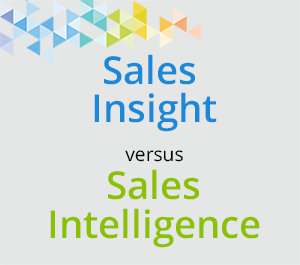Sales Insight vs. Sales Intelligence: Is There a Difference?
Let’s get right to the point. There is a big difference between sales insight and sales intelligence. Here is how I define it for my clients: Having sales insight means that sales operations can access data, pulls it into reports and dashboards, and deliver it to the sales organization. Having sales intelligence means that sales operations can access a lot of data, but has a good data strategy in place to determine what data is needed and if it is valid – and can correlate and analyze the important data to create actionable conclusions. Sales ops can then take those conclusions and deliver audience-centric reports or dashboards (e.g. a sales manager dashboard vs. a sales rep dashboard) in a specified cadence with defined actions that help the receiver interpret the data and provide guidance on what to do. Now, that is intelligence!
 Time for the reality check. This is not easy, I get that, but nothing of value ever comes easy. If, after reading the first paragraph of this blog post, you raised your hand as recognizing you are only delivering sales insight – great. You have made it through the first step – recognizing you have a problem. The next step is making improvements to begin delivering sales intelligence– here’s how to do it:
Time for the reality check. This is not easy, I get that, but nothing of value ever comes easy. If, after reading the first paragraph of this blog post, you raised your hand as recognizing you are only delivering sales insight – great. You have made it through the first step – recognizing you have a problem. The next step is making improvements to begin delivering sales intelligence– here’s how to do it:
- Data management. You can’t move forward until you get out of the “garbage in, garbage out” world. I’m not saying you have to have perfect data (by the way, no one does), but create a data management initiative that interprets what data you have and what data you need. Next, determine where your data exists, if it is accessible, and how the new data you need can be obtained.
- Data strategy. Now that you have mapped out the data requirements, it’s time to create the strategy. The strategy determines who owns the data, the plan for keeping it valid and how to integrate it with other data sources needed by sales. Data strategy is often jointly owned by sales operations and marketing operations.
- Aligned measurement. With access to the data needed or recognition of the data you have, it is important to understand your sales audience and what intelligence they need to better manage their business. This requires understanding each function within the sales ecosystem and whether they are more tactically or strategically focused. Our Aligned Measurement Framework is a great tool to help organizations accomplish this task.
- Analytics proficiency. This is all about one word: readiness. Before sales operations can begin to model critical analysis and promise intelligence, it must understand its analytical capabilities. This requires mapping the competencies within the sales operations function as well as the capacity. Some individuals might be able to perform great analysis, but don’t have the productive time to ensure it can be done consistently and repeatedly.
- Reporting. This is all about tools and technology. Do you have a mechanism to report the information in real time and in a scheduled cadence? Reporting must be done through a tool or technology that the entire sales organization can access and understands how to use. In a best practice scenario, this technology is based out of the sales force automation platform.
Sales organizations have access to a lot of information and that data set is continuing to grow. To truly innovate the way your data is viewed by sales leaders, managers and reps must follow the intelligent path to operational success.
To learn more, please visit artandscience.siriusdecisions.com or consider joining us at our upcoming Summit!